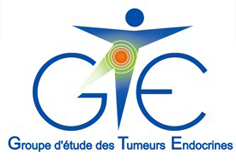BEVANEC: FOLFIRI +/- BEVACIZUMAB
- Type d'étude :
- Phase II-R
- Promoteur :
- HCL / Prodige
- Etat actuel de l'étude :
- Terminée aux inclusions
Assessment of the efficacy of bevacizumab in combination with Folfiri as second-line treatment after the failure of the cisplatin (or carboplatin)-etoposide combination in patients suffering from an advanced inoperable poorly differentiated neuroendocrine carcinoma of an unknown or gastroentero-pancreatic primary cancer. A phase 2 non-comparative randomized study »
Prodige 41 – BEVANEC study
Hospices Civils de Lyon / Prodige
Thomas WALTER,  Mail Walter
Mail Walter
• Main objective: to show that, after the failure of a first-line chemotherapy using platinum-etoposide, the combination Folfiri-bevacizumab allows significant prolongation of overall survival in adult patients with GEP-NEC.
• Secondary objectives
– Objective response rate (complete response + partial response),
– Response duration
– Disease control rate (objective response + stable disease),
– Progression-free survival,
– Tolerance,
– Biochemical response (LDH, NSE, chromogranin A).
A national, multicenter, open, randomized phase II non-comparative study assessing the tolerance and efficacy of the combination Folfiri-bevacizumab versus a Folfiri chemotherapy after the failure of platinum-etoposide in patients suffering from progressive NEC of unknown or GEP primary cancer.
• Man or woman aged > 18 years old,
• Poorly differentiated neuroendocrine carcinoma (NEC) from a GEP primary or an unknown primary cancer, locally advanced and/or metastatic (according to the WHO 2010),
• Centralized review of the diagnostic by a consulting pathologist specializing in NET (TENPATH network),
• Recommendation of a second-line chemotherapy after progression, documented using the RECIST criteria v.1.1, and after a first-line chemotherapy treatment by cisplatin (or carboplatin) + etoposide or in the event of progression in the 6 months following the discontinuation of this first-line treatment,
• Patients presenting at least one measurable target lesion according to the RECIST criteria v.1.1, in an area not previously irradiated,
• General condition < 2 (WHO),
• Patient who signed the informed consent form.
Relating to the tumor, the patient, and previous treatment:
• Well differentiated gastroentero-pancreatic (GEP) neuroendocrine tumor (NET) (G1 and G2 according to the WHO 2010),
• Mixed tumor,
• First-line chemotherapy other than cisplatin (or carboplatin) and etoposide,
• All malignant disease in the three years before randomization, with the exception of basal cell carcinoma or in situ cervical cancer treated for curative purposes,
• A pregnant or breastfeeding woman,
• Lack of efficient contraception (for men or women of reproductive age),
• All medical, geographical, social, and psychological conditions or a legal situation that will not allow the patient to finish the study or sign an informed consent form,
Relating to the chemotherapy (Folfiri):
• Any of the following uncontrolled progressive diseases in the 6 months before randomization: liver failure, renal insufficiency, respiratory distress, congestive heart failure (NYHA III-IV), unstable angina, myocardial infarction, significant arrhythmia,
• Known deficiency in dihydropyrimidine dehydrogenase,
• Known Gilbert’s syndrome,
• Total bilirubin level >1.5x the upper limit of normal (ULN); AST and/or ALT >5x ULN; TP <50%;
• Neutrophils <1.5×109/l, platelets <100×109/l, hemoglobin <9 g/dl,
• Chronic uncontrolled diarrhea, unresolved intestinal occlusion or subocclusion,
• History of anaphylactic reaction or known intolerance to atropine (sulfate) or to loperamide or to antiemetics administered in association with Folfiri,
• All treatment with concomitant anticonvulsive agents, CYP3A4 inducers (phenytoin, phenobarbital, carbamazepine), discontinued for at least 7 days,
Relating to bevacizumab:
• Uncontrolled brain metastases (by local treatment),
• All uncontrolled progressive disease within 1 month prior to randomization: grade 3-4 gastrointestinal bleeding (peptic ulcer, erosive esophagitis or gastritis), infectious disease or intestinal inflammation, diverticulitis, pulmonary embolism or other uncontrolled thromboembolic event,
• Uncontrolled high blood pressure defined as a systolic blood pressure >140 mmHg or diastolic pressure >90 mmHg,
• Patients receiving anticoagulant treatment with an unstable dose of a vitamin K antagonist treatment, and/or having an abnormal INR (>3) in the four weeks before the randomization,
• Verified proteinuria above or equal to 1g/24 hours measured from 24 hours of urine if the urinary protein dipstick control is above or equal to 2+,
• Creatinine clearance (MDRD) <50 ml/min.
• Hypersensitivity to the active substance or to any of the excipients.
• Hypersensitivity to Chinese Hamster Ovary (CHO) cell products or other recombinant human or humanised antibodies.
124 patients, 25 inclus au 03/08/2018
